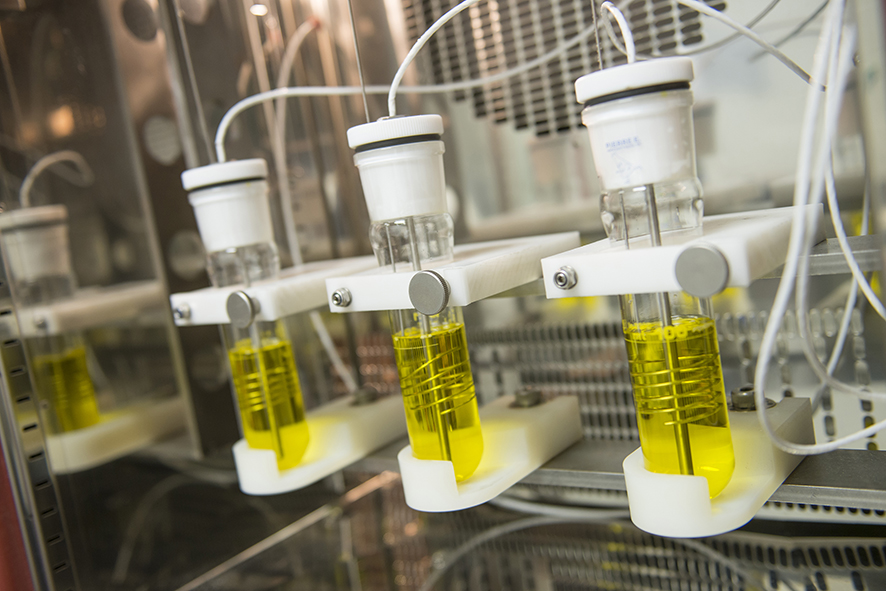Heat Transfer Fluid: Vital for Optimizing Industrial Heating & Cooling Solutions
Heat Transfer Fluid: Vital for Optimizing Industrial Heating & Cooling Solutions
Blog Article
Just How Heat Transfer Fluid Adds To Sustainable and Affordable Workflow
In the contemporary industrial landscape, the function of warm transfer fluids (HTFs) in advertising lasting and cost-effective operations can not be overstated. These fluids are crucial in enhancing thermal management systems, therefore considerably enhancing power performance and reducing operational prices. The ecological benefits of sophisticated HTFs, with their high thermal stability and low poisoning, are undeniable. They not just extend system durability yet likewise add to the reduction of harmful discharges. The true capacity of HTFs is understood with the thorough selection procedure, ensuring compatibility and security. But what variables should direct this essential choice?
Comprehending Warmth Transfer Fluids
In the realm of thermal monitoring, heat transfer fluids (HTFs) act as vital agents for moving thermal energy from one area to an additional. These liquids play an essential function in different industrial applications, including chemical handling, power generation, and cooling and heating systems. HTFs are specifically engineered to run within a vast array of temperatures, effectively helping with the transfer of heat while keeping a secure thermal profile. Their capacity to work under severe problems-- whether heats or cryogenic levels-- makes them important in atmospheres demanding specific thermal control.
The composition of warmth transfer liquids can vary considerably, including alternatives such as mineral oils, artificial oils, glycols, and molten salts. Each type offers distinctive benefits, such as boosted thermal security, low thickness, and high boiling points, which are picked based upon details functional demands. Additionally, the choice of HTF influences not just the effectiveness of heat transfer however additionally the durability and safety and security of the system in which it is utilized.
As industries continue to introduce, the development of innovative HTFs, characterized by their improved thermal conductivity and minimized environmental impact, is vital for meeting the needs of modern thermal monitoring challenges.
Enhancing Power Effectiveness

Improving energy effectiveness has actually come to be a paramount worry throughout various markets, triggering a more detailed exam of heat transfer fluids' function in enhancing thermal management systems. These fluids are integral to keeping the wanted temperature level in processes, thus reducing energy waste and boosting overall system efficiency. By selecting an appropriate heat transfer fluid, sectors can considerably enhance their energy efficiency, bring about minimized energy consumption.

Advanced formulations of warmth transfer fluids have been developed to stand up to extreme temperatures while keeping security and efficiency. Improving power performance through optimal warm transfer liquid option is not just a technical necessity however additionally an ecological necessary.
Decreasing Operational Expenses
Functional costs are a substantial factor to consider for industries looking for to keep competitive benefit, and the selection of heat transfer fluid plays a crucial function in cost administration. Picking an appropriate warm transfer liquid can bring about substantial price savings by improving system efficiency and reducing energy usage. High-performance fluids minimize thermal deterioration, which consequently reduces the frequency of liquid substitute and downtime connected with upkeep, therefore reducing functional costs.
Moreover, warmth transfer liquids with remarkable thermal stability and corrosion resistance expand the life-span of devices. This decreases the need for frequent repairs and substitutes, which can be pricey and disruptive to operations. By investing in top quality liquids, sectors can attain long-lasting reductions in upkeep prices and enhance the reliability of their systems.
Furthermore, progressed heat transfer fluids commonly exhibit lower thickness at running temperatures, which boosts pump efficiency and minimizes energy description usage in liquid circulation. Lots of modern-day heat transfer liquids are crafted to run effectively over a large temperature variety, lowering the need my response for numerous fluid types, consequently streamlining inventory needs and reducing connected prices.
Ecological Impact Reduction
The press towards minimizing ecological effect has obtained energy in sectors leveraging heat transfer liquids. Companies are significantly recognizing the significance of decreasing ecological impacts by taking on lasting techniques. Warmth transfer fluids (HTFs) play an important function in this shift, providing chances to enhance energy effectiveness and minimize discharges. By selecting HTFs with high thermal stability and reduced poisoning, markets can ensure marginal leak and deterioration, hence decreasing dangerous environmental releases.
Additionally, making use of sophisticated warmth transfer liquids adds to enhanced system efficiency, lowering the total power consumption. This reduction not only results in price savings yet likewise lowers co2 discharges, aiding in the battle versus environment modification. Fluids that are biodegradable and recyclable further boost sustainability initiatives, as they diminish waste and promote circular economic climate methods.
Additionally, incorporating HTFs right into closed-loop systems prevents fluid loss and contamination of the surrounding atmosphere. This approach makes sure that fluids are recycled, reducing the need for brand-new resources and restricting waste generation. By embracing these eco mindful approaches, markets can considerably reduce their ecological influence while maintaining high functional efficiency, lining up with international sustainability goals and governing demands.
Picking the Right HTF
Selecting the appropriate warmth transfer liquid (HTF) is a crucial action in progressing environmental sustainability within commercial procedures - heat transfer fluid. An excellent HTF try this out must have a high thermal capacity, low thickness, and high thermal conductivity to guarantee efficient heat transfer.
When choosing an HTF, it is important to consider its compatibility with system materials to stay clear of deterioration and chain reaction. This makes sure durability and decreases upkeep prices. Moreover, the fluid should be safe and eco-friendly, decreasing its environmental footprint and ensuring conformity with ecological policies. The lifecycle cost of the HTF, incorporating purchase, operation, and disposal, should also be reviewed to make certain financial feasibility.
Conclusion

Report this page